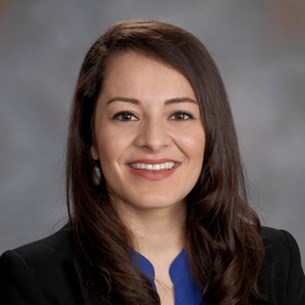Meeting
2022 ASCO Annual Meeting

Texas Tech University Health Sciences Center, El Paso, TX
Paulina Ramirez , Eugene Patrick Toy , Suzanne Lababidi , Harvey Greenberg , Christina Bracamontes , Angela Jones , Zuber D. Mulla , Jennifer L. Brown
Background: Mobile applications have changed the way that users access information and revolutionized healthcare by allowing patients to educate themselves regarding their diagnosis and treatment. Challenges in developing a mobile health application include patient satisfaction and usage over time. Barriers to usage include trust, personalization, and accessibility. Investigating the patient population’s preferences on app content and ease of use is imperative. The use of mobile applications specifically for Latina Gynecologic Oncology patients undergoing treatment has yet to be investigated. Methods: Fifty-six patients were recruited from the Gynecologic Oncology clinic at an urban academic health sciences center located on the Texas-Mexico border. Cross-sectional analyses were performed. Subjects were asked a series of 10-point Likert scale questions including how comfortable they would feel using medical applications on their smartphones. Linear regression models were fit with this scale score as the outcome. Results: The age of the 56 patients ranged from 28 to 77 years with a mean of 53.9 years (SD: 11.1). Spanish was the preferred language of 53.8% of the patients (28/52). Forty-four subjects were available for the regression analyses. Subjects were asked, “Would you feel comfortable using medical applications on your smartphone,” where 1 represented “not at all comfortable” and 10 represented “very comfortable”. The mean comfort scale score was 7.39 (SD: 2.85). Thirty of the 44 subjects (68.2%) replied “Multiple times per day” to the question about how frequently they use mobile apps on their phone. After controlling for the patient’s age in a regression model, patients who used mobile apps multiple times per day had an average comfort scale score that was 1.75 points higher than that of women who did not use mobile apps on their phone multiple times per day (p = 0.03). After adjusting for the frequency of mobile app use, there was a reduction of 0.11 points (p = 0.002) in the comfort scale score for every one year increase in the patient’s age. Conclusions: Our unique pilot study found a positive association between the frequency of current app use and anticipated comfort in using smartphone medical applications. Overall, patients demonstrated a considerable amount of comfort with the prospect of using a mobile app. These findings support the idea of creating a mobile app designed to monitor Latina Gynecologic Oncology patients in efforts to lessen patients’ postoperative burden, improve mortality and morbidity outcomes, and decrease health care system costs.
| Model | Frequency of mobile app usage: | Age: 1 year increase | Education: College vs. Less education | Adjusted R-squared |
|---|---|---|---|---|
| 1 | 2.35 (p = 0.01) | - | - | 0.13 |
| 2 | 1.68 (p = 0.046) | -0.10 (p = 0.003) | 0.33 (p = 0.66) | 0.28 |
| 3 (Final) | 1.75 (p = 0.03) | -0.11 (p = 0.002) | - | 0.30 |
Disclaimer
This material on this page is ©2024 American Society of Clinical Oncology, all rights reserved. Licensing available upon request. For more information, please contact licensing@asco.org
2022 ASCO Annual Meeting
Poster Session
Care Delivery and Regulatory Policy
Care Delivery and Quality Care
Digital Technology
J Clin Oncol 40, 2022 (suppl 16; abstr 1571)
10.1200/JCO.2022.40.16_suppl.1571
1571
163
Abstract Disclosures
2022 ASCO Quality Care Symposium
First Author: Chelsea L. McGowen
2023 ASCO Annual Meeting
First Author: Mary Katherine Anastasio
2023 ASCO Quality Care Symposium
First Author: Riha Vaidya
2023 ASCO Quality Care Symposium
First Author: Omer Hassan Jamy